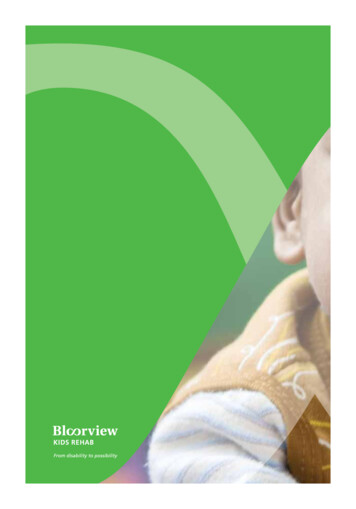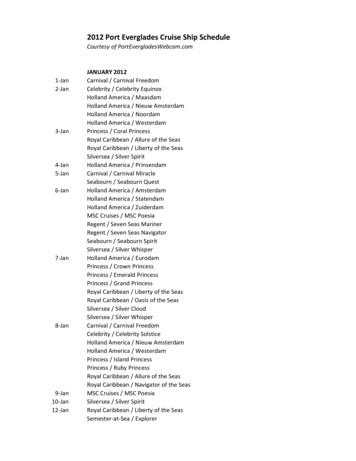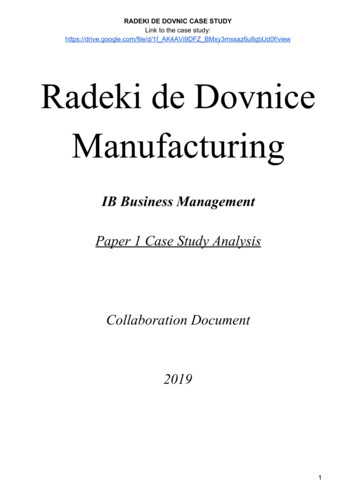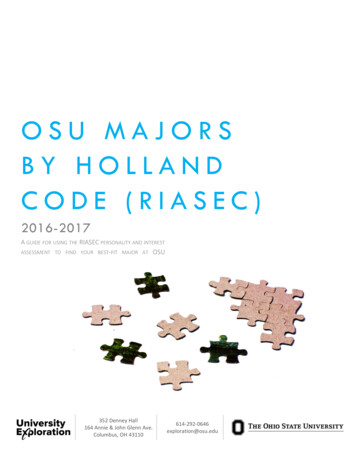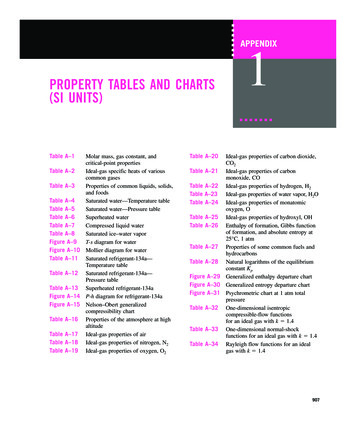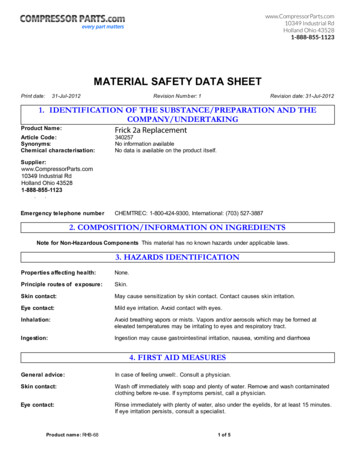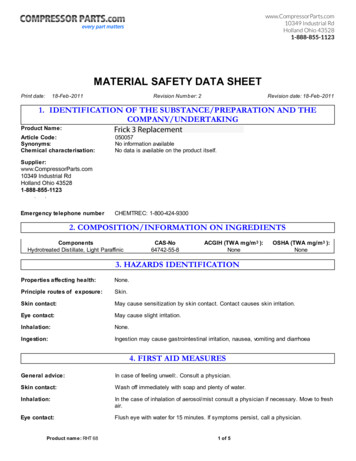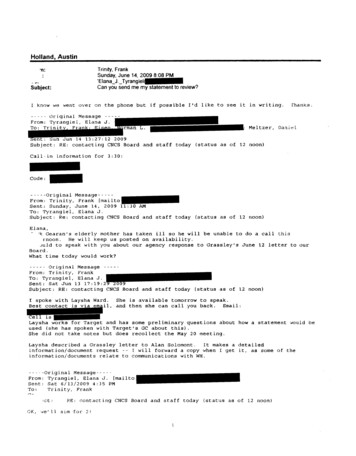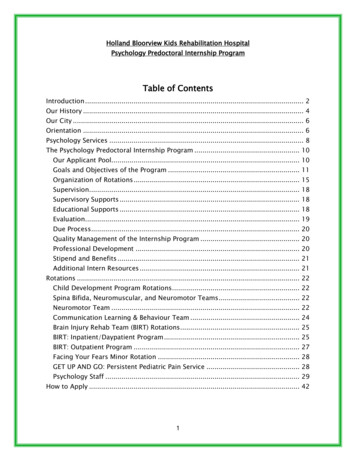
Transcription
Holland Bloorview Kids Rehabilitation HospitalPsychology Predoctoral Internship ProgramTable of ContentsIntroduction . 2Our History . 4Our City . 6Orientation . 6Psychology Services . 8The Psychology Predoctoral Internship Program . 10Our Applicant Pool. 10Goals and Objectives of the Program . 11Organization of Rotations . 15Supervision. 18Supervisory Supports . 18Educational Supports . 18Evaluation. 19Due Process. 20Quality Management of the Internship Program . 20Professional Development . 20Stipend and Benefits . 21Additional Intern Resources . 21Rotations . 22Child Development Program Rotations . 22Spina Bifida, Neuromuscular, and Neuromotor Teams . 22Neuromotor Team . 22Communication Learning & Behaviour Team . 24Brain Injury Rehab Team (BIRT) Rotations . 25BIRT: Inpatient/Daypatient Program . 25BIRT: Outpatient Program . 27Facing Your Fears Minor Rotation . 28GET UP AND GO: Persistent Pediatric Pain Service . 28Psychology Staff . 29How to Apply . 421
Holland Bloorview Kids Rehabilitation HospitalA World of PossibilityIntroductionChildren, youth and families are the heart of Holland Bloorview Kids RehabilitationHospital (formerly Bloorview Kids Rehab).As the country's largest pediatricrehabilitation facility for young people with disabilities and special needs, ourfamily-centered clinical and research programs have developed specializedexpertise in the areas of rehabilitation and habilitation, advocacy, education andresearch. Services at Holland Bloorview include inpatient hospital care for childrenwith complex medical or rehabilitation needs, respite care, outpatient clinics andcommunity outreach programs. We also have a school on the premises which offersa comprehensive program for 4 to 7 year old children with physical disabilities. Theschool also provides ongoing educational programming for children and youth fromkindergarten to high school during their inpatient or day patient stays in thehospital.Children, youth and their families from across the province come toHolland Bloorview when their special needs cannot be addressed in their homecommunities. Each year more than 6,000 clients and their families benefit from theservices provided by Holland Bloorview.Clinical teams consist of professionals from a number of areas (e.g., physicians,nurses, dentists, psychologists, physiotherapists, occupational therapists, speechand language pathologists, child and youth workers, child life specialists, recreationtherapists, teachers, social workers), and are complemented by rehabilitationengineers and researchers. We are the local service provider for several thousandyoung people with disabilities who live in the Toronto area.Teaching and LearningHolland Bloorview Kids Rehabilitation Hospital is a teaching hospital and is fullyaffiliated with the University of Toronto.RehabilitationHospitalformalizeditsIn 2011 Holland Bloorview Kidscommitmenttoeducationwiththeestablishment of its Teaching and Learning Institute (the Institute) fulfilling theorganization’s mandate as articulated in the 2009-2014 Strategic Plan, Innovatingand Excelling in Teaching and Learning. The role of the Institute is to enhance anddevelop learning initiatives throughout Holland Bloorview. Through this program,our organization has developed a range of simulation-based teaching activities2
(such as the use of standardized patients) that can be available to staff and studentsalike, including interns. One of our supervisors, Dr. Janice Hansen, has previousexperience as a standardized patient, and has been actively involved in thedevelopment and implementation of simulation activities.The Teaching and Learning Team, has developed a new Strategic Plan for 2015-2022 with five strategic directions: 1) Support Students; 2) Buildscholarshipandevaluation into Teaching and Learning activities; 3) Cultivate excellence in teaching;4) Integrate teaching and learning across the organization; and 5) Model knowledgetranslation for the broader healthcare system in the field of childhood disability.ResearchWe are also home to the Bloorview Research Institute (BRI), the only pediatricrehabilitation research institute within an academic health science centre in Canada.Multidisciplinary teams of scientists (encompassing psychology, epidemiology,biostatistics, engineering, outcomes research, health economics, physiotherapy,occupational therapy, speech language pathology, education, music therapy)conduct applied clinical research intended to improve the quality of care and qualityof life for children and youth with disabilities and special needs.One of our neuropsychologists, Dr. Shannon Scratch, works as a Clinician Scientistwithin the BRI. She is a member of the Concussion Centre which is examining howthe youth brain recovers following concussion. In addition, her research programfocuses on parent mental health and family functioning, as well as developingknowledge translation products advocating for clients with acquired brain injury andtheir families. In addition to Dr. Scratch, Dr. Sara Stevens holds joint clinical andresearch positions within the BRI. Dr. Stevens’ research focuses on best practices inpsychosocial and cognitive rehabilitation, as well as neuropsychological outcomesfollowing acquired brain injury.Interns working in this rotation may have theopportunity to participate in some of this work.One of our other supervising psychologists, Dr. Jessica Brian, is the co-lead for theAutism Research Centre (ARC), which is also part of the Bloorview Research Institute.The ARC conducts research aimed at improving outcomes and quality of life forchildren with autism spectrum disorder (ASD). The ARC brings together a team ofprofessionals with a wide range of expertise. These include professionals inneurology, developmental pediatrics, psychology, psychometry, engineering, early3
intervention, occupational therapy, speech and language pathology, and nursing.Ongoing research studies include the characterization of autism and the earliestsigns of risk, examination of developmental trajectories, pharmacological andbehavioural intervention studies, and technology development.Community CollaborationBy providing professional education and consultation, Holland Bloorview is animportant resource for other rehabilitation centres and agencies that serve children.Working in partnership with our clients’ communities within Toronto and across theprovince, we strive to develop local resources so that increasingly more youngpeople can receive the services they need closer to home. For example, we have anestablished satellite clinic in Toronto, so that children under five years of age canreceive tertiary multidisciplinary diagnostic services in their own communities. Ourservices, partnerships, research and education initiatives are all aimed at helpingchildren and youth with disabilities develop the skills they need to achieve theirgoals. Hence, our vision statement: The most meaningful andhealthy futures for all children, youth and families.Embracing DiversityWe serve a variety of children and youth with many disabilities and diagnoses,including acquired and traumatic injury, autism spectrum disorder, brain injury,cerebral palsy, chronic pain, post-concussion syndrome, spina bifida, and geneticdisorders.Many of our clients have multiple medical concerns and present withadditional complex needs including family issues, financial difficulties, and languageand cultural differences. Indeed, as we are located in the most multicultural city inthe world, Holland Bloorview is committed to promoting a climate that welcomes,understands and respects diversity in all forms. Respect for diversity is embeddedwithin our Strategic Plan and new employees and interns are required to learn aboutdiversity and cultural sensitivity during their orientation to Holland Bloorview. Ourmain facility is accessible for people with physical disabilities, and there are manystaff members who have disabilities. The staff at Holland Bloorview also reflect ourcity’s ethnic diversity and speak a variety of languages. We have access to an agencythat provides interpreters in many languages.Our History4
Over the past century, Holland Bloorview has evolved from two distinct entities,whose name changes have reflected the zeitgeist of the times. In 1899, a group ofcommunity-minded women met in Toronto to discuss the creation of a Home forIncurable Children. Many of the home’s founders had already helped establish theHospital for Sick Children in 1875, and were concerned with the lack of servicesavailable for children following acute care treatment at the hospital. Within sevenmonths, a house at 138 Avenue Road and furnishings were donated for 15 children.In 1964, the Home for Incurable Children became Bloorview Children’s Hospital.Meanwhile, in 1962, the Ontario Crippled Children’s Centre opened at 350 RumseyRoad in Toronto. In the early 1980’s, in honour of Dr. Hugh MacMillan, one of theCentre’s early physicians, Ontario Crippled Children’s Centre was renamed HughMacMillan Medical Centre and then renamed Hugh MacMillan Rehabilitation Centrein 1989.In 1996, Bloorview Children’s Hospital and Hugh MacMillan Rehabilitation Centremerged to create a unified children’s rehabilitation and habilitation facility calledBloorview MacMillan Centre, later changed to Bloorview MacMillan Children’s Centrein 2001. Following the move to our new facility in February, 2006, our organizationbecame Bloorview Kids Rehab. In June 2010 our name changed again to reflect asubstantial donation from the Holland family, and we became Holland BloorviewKids Rehabilitation Hospital.We currently offer services on two sites: the main site is at our state-of-the artbuilding at 150 Kilgour Road, which was the original MacMillan site location. We arecentrally located in the city within a residential neighbourhood that backs onto alarge system of parks and recreational trails.In addition to housing offices forclinical and administrative staff, our main facility includes many amenities to benefitclients, families, staff and the community at large. Highlighted features include aCentre for the Arts, offering accessible activities related to the visual and performingarts, a family resource centre including a library and internet access, a swimmingpool, fitness room for staff, roof-top terrace, hotel for parents of inpatients, and acafeteria. Additional workplace amenities include a daycare for the children of staffand community parents, as well as a gymnasium that can be booked by staff foractivities.We also offer diagnostic services for children under age 5 at a satellite clinic locatedon Eglinton West (near Eglinton and Dufferin).5
Our CityToronto, a metropolis of 2.7 million people, has much to offer. One of the mostdiverse cities in the world, Toronto embodies the ‘mosaic’ character of our country.Pockets of culture representing almost every corner of the world are sprinkledthroughout Toronto. Annual events such as Carnival and Pride Festivals, the TorontoFilm and Jazz Festivals, the Molson Indy and the Santa Claus Parade areinternationally known. Toronto is home to numerous attractions (CN Tower, RoyalOntario Museum, Art Gallery of Ontario, Toronto Science Centre, and Ontario Place),sport, theatre and entertainment venues (the Air Canada Centre, the Rogers Centre(formerly Skydome), Roy Thompson Hall and the Princess of Wales Theatre) and anexciting nightlife (the Beaches, the Danforth, Yorkville, College Street) scatteredthroughout this vibrant city. The Toronto Islands, accessible by ferry, are one of ourbest-kept secrets. There are beautiful and tranquil areas to bicycle, rollerblade, orsimply enjoy a picnic lunch. As well, there are myriad interconnecting parks andpaths that weave through the enormous Don Valley.The park system providesmiles and miles of enjoyment for hikers, cyclists, or runners and is directlyconnected to the grounds of our building!OrientationHolland Bloorview Kids Rehabilitation Hospital requires that each new staff memberparticipate in a General Orientation.Psychology interns attend a four-dayorientation program that will familiarize them with the Values, Mission, andStructure of the organization as well as provide training in a variety of skillsnecessary for dealing with our varied and complex clientele.In addition to thisgeneral orientation, interns will also learn our computerized system (MeditechExpanse) for receiving referrals, submitting and signing reports, and trackingworkload. While the specific details of interns’ work settings may differ, the skillsand knowledge acquired during these sessions will familiarize them with the generalway in which a large health centre operates in terms of administrative policies andprocedures. To facilitate the orientation process, interns are also provided with anorientation binder that includes a list of policies and forms both specific to thepractice of psychology and to administrative guidelines for working at HollandBloorview. Like all new staff, interns must also sign an oath of confidentiality andconsent to a criminal reference check.6
An important part of working in an interdisciplinary setting is interacting with otherteam members. As part of the formal orientation process, interns will participate ina unique full-day training session on collaborative practice, demonstrated throughlive simulations using standardized patients.Interns will also have severalopportunities to meet informally and speak with staff from the various disciplines,either through team rounds or meetings arranged with the intern’s supervisor.Various noon-hour and after-work activities and programs are offered whichprovide opportunities for interns to interact with each other and staff on a moreinformal basis as well. In the past, these activities have included lunchtime swims,walking and running groups, evening volleyball, camping trips, yoga classes, andgolf tournaments.7
Psychology ServicesThe Psychology staff at Holland Bloorview work within a program managementstructure. We provide services within the Brain Injury Rehab Team, and within anumber of different teams under the Child Development Program, including servicesprovided off-site at our satellite clinic. We also have a Get Up and Go: PersistentPediatric Pain Service, which is offered through our inpatient Specialized Orthopedicand Developmental Rehabilitation Program (SODR).Brain Injury Rehab TeamThe Brain Injury Rehab Team (BIRT) serves inpatient, daypatient and outpatientclients who have sustained an acquired brain injury and their families. Intensiverehabilitation assessment and treatment services are provided by a ,socialworkers,physiotherapists,occupational therapists, speech language pathologists, resource child and youthworkers, child life specialists, therapeutic recreation specialists, and specialeducation teachers. Neuropsychologists also provide assessment and consultationservices as part of a multi-disiplinary Concussion Team for children and youthexperiencing post-concussion symptoms persisting over one month after injury.Child Development ProgramPsychologists also work in several different teams under the Child DevelopmentProgram (CDP).This is a broad-based program providing services to clients with avariety of neurodevelopmental disabilities such as cerebral palsy and epilepsy (theNeuromotor Team), spina bifida and spinal cord injury, and neuromusculardisorders, each with their own teams. The CDP also includes the Communication,Learning and Behaviour Team (CLBT) which is a specialized diagnostic team thatprovides assessments for clients who may have Autism Spectrum Disorder (ASD) atthe main and satellite sites.In addition to diagnostic services, the CLBT offers the Facing Your Fears program, agroup cognitive behavioural therapy (CBT) program for children with ASD andanxiety. The Facing Your Fears program is designed for both parents and theirchildren to participate in sessions over 14 weeks, plus a booster session. Interns areclosely involved in facilitating the Facing Your Fears groups. There are also oftenopportunities for individual intervention with the Facing Your Fears clients.8
Get Up and Go: Persistent Pediatric Pain ServiceWe have recently launched an intervention-based service to treat clients withpersistent (chronic) pain, the psychology portion of which is led by one of ourclinical supervisors. Known as the Get Up and Go: Persistent Pediatric Pain Service,it is an intensive interdisciplinary rehabilitation service for children and youth (aged12 to 18 years) who are experiencing severe pain-related disability in social,emotional, physical, and/or academic domains of functioning. This is the first in-patient, interdisciplinary persistent pediatric pain service in Canada. The service is 4weeks in total, with two weeks inpatient followed by two weeks as day-treatmentclients. Interns involved in this service typically provide individual therapy to youthand consult on an interdisciplinary team. They may also participate in and observetherapy groups.Psychology MeetingsThe psychology group maintains its cohesion as a discipline through regularadministrative and educational (e.g., Clinical Rounds, Journal Club) meetings. Aspart of our professional governance structure, our monthly mandated PsychologyPractice Council meetings provide a forum that facilitates dialogue, supportsdecision-making, and promotes excellence in professional practice. Business itemsdiscussed can include feedback about management initiatives, practice and ethicalissues or guest speakers.9
The Psychology Predoctoral Internship landBloorviewKidsRehabilitation Hospital Foundation grants to support our internship program thatformally began in the fall of 1999. We first became accredited with the CanadianPsychological Association (CPA) in 2002, and in November 2011, we were awarded are-accreditation term of six years. In November 2016 we underwent another sitevisit and were awarded a re-accreditation term of seven years.For informationabout CPA accreditation, please contact the Registrar at accreditation@cpa.ca, or theCPA Office at 141 Laurier Ave West, Suite 702, Ottawa, Ontario, K1P 5J3. As we arean accredited program, the internship standards from CPA for application, rotationsand delivery of the program are being followed.internship positions available.There are two full-time paidOur Applicant PoolWe have a long history of training practicum and internship psychology studentsfrom graduate clinical programs at universities across Ontario. Our initial evelopmental,ClinicalNeuropsychology, Neuroscience or School and Child programs from local Ontariouniversities. When we obtained CPA accreditation as a clinical psychology internshipprogram, we began to attract interns from clinical psychology programs acrossCanada as well as the United States, who are interested in acquiring experience witha specialized and diverse pediatric population. We now accept only candidates fromCPA or APA-accredited clinical, school, or counseling programs. Where possible, welook for applicants who have had a developmental focus in their academic orresearch work. Successful intern candidates have had graduate level training inpediatric psychology (including courses in development and child assessment), andclinical experience with children and adolescents. We look for candidates with astrong background in the administration and scoring of a number of standardizedpediatric assessment measures (i.e., cognitive, academic, behavioural) as well assome intervention experience. Most of our interns expect to work as clinical childpsychologists or clinical neuropsychologists and are prepared to work in a variety ofsettings such as school boards, pediatric health facilities and private practice.Graduate students enrolled in APA or CPA-accredited doctoral programs in clinical,counselling or school psychology that have completed their coursework and have atotal of at least 1000 hours of supervised practicum experience (including direct and10
indirect services, as well as support hours) are invited to apply. (See page 42 forinformation on how to apply).Goals and Objectives of the ProgramOur primary goal in offering the internship is to train future psychologists who arecompetent in providing clinical services to children and their families.Using amastery model of training, interns gain experience with diverse health care issues,and have opportunities to work with children with medical diagnoses not oftenencountered in other settings. At the same time, the internship program providestraining in broad-based skills of assessment, consultation and treatment that can bereadily generalized to other populations, including typically developing children andadolescents who may be referred to psychology services in school boards,community agencies, hospitals, or private clinics.In fact, our graduates can befound working in all of these settings.We follow a scientist-practitioner model whereby we offer training in evidencebased practice with respect to the core competencies of assessment, ersonalstandards and ethics, supervision, and research.relationships,professionalWithin this model we adopt a“teach-show-do” approach where interns are expected to assume increasedresponsibility and independence as the year progresses. Through this approach,interns acquire valuable skills such as conducting comprehensive intake interviews,providing therapeutic feedback, conducting standardized assessments as well aslearning how to adapt assessments to accommodate varying abilities and needs,formulating and communicating differential diagnoses, delivering multimodalinterventions in both group and individual formats, and providing consultation toparents, teachers, and other professionals.Goal 1. Comprehensive, Diverse Training OpportunitiesWith our primary goal in mind, rotations are selected to ensure a diverse experiencethat includes a variety of populations (inpatient/outpatient, medical diagnoses),age-ranges, psychological diagnoses, ethnicity, assessments al,psycho-social),andpresentingconcerns(learning disability, attention-deficit/hyperactivity disorder, intellectual disability,autism spectrum disorder, post-concussion symptoms, traumatic brain injury,acquired brain injury, chronic pain).Given our multilingual client population we11
also ensure that our interns have opportunities to work with interpreters duringtheir placement.In keeping with CPA accreditation standards, training is providedin the key areas listed below.Goal 2. Training in Assessment, Intervention, Consultation and Program Evaluation2a) Assessment. Assessment is a primary mandate of psychological services atHolland Bloorview and interns can expect to receive extensive and rich training inthis competency area regardless of their rotations.Specifically, our objectives include enhancing and developing the breadth and depthof skills in psychological assessment such as conducting interviews, selectingappropriate assessment measures, administering and scoring tests, interpreting andintegrating test results with other data, making diagnoses, communicating feedbackto clients/families and interdisciplinary teams, and writing reports.As assessment occurs within most psychology services, depending on chosenrotations, interns may receive training in neuropsychological assessment, AutismSpectrum Disorder (ASD) assessment in young children or older youth, as well as incognitive and/or behavioural/social-emotional assessment of children with complexmedical diagnoses and physical and/or cognitive disabilities.2b) Intervention. Intervention opportunities exist within a number of services atHolland Bloorview and interns are able to gain experience in different rvention, group and individual therapy).Therapy(CBT),mindfulness-basedTraining objectives for this competency include developing skills in choosingappropriate, evidence-based interventions and/or therapeutic techniques forchildren with social-emotional and/or behavioural difficulties (often in the contextof complex medical needs, acquired brain injury, and/or developmental disability),engaging children and parents in the therapeutic process,implementingintervention in a competent way, monitoring progress and adapting intervention asnecessary, and handling crises and other difficult situations (e.g., suicidality, rupturein therapeutic relationship) as they arise.Interns typically gain experience in CBT in a group format (e.g., anxiety treatmentfor youth with ASD through ‘Facing your Fears’ program or anxiety treatment for12
Neuromotor clients). Experience with group mindfulness-based therapy is alsoavailable through the ‘Get up and Go’ persistent pain program. Opportunities forindividual therapy with children and youth are available through the ‘Get up and Go’persistent pain program (using CBT and mindfulness approaches), through the‘Facing your Fears’ program (e.g., modifying group CBT for individuals notappropriate for group treatment), and also occasionally through Neuromuscular andNeuromotor teams. In addition, there may be opportunities through the Brain InjuryRehab Team (BIRT) inpatient rotation for interns to provide individual as well asgroup supportive counseling services to clients who are experiencing coping andadaptation issues as a result of their illnesses or injuries.2c) Consultation. Consultation is another primary component of psychologicalpractice at Holland Bloorview.Training objectives for this competency includeunderstanding of one’s role as a consultant, developing skills in providingappropriate consultation to other clinicians, both within one’s own agency and tooutside agencies, and seeking out consultation with other professionals as needed.Interns will have opportunities within most rotations to provide consultations bothinternally, on multi-disciplinary teams, and externally, to schools and otheragencies.2d) Program Evaluation.Activities through which interns develop competency inprogram evaluation include: participation in ongoing program evaluation projects,and/or helping to design and implement new projects, participating in internshipquality improvement activities, and participating in didactic learning related toprogram evaluation.Interns are typically involved in one of the ongoing program evaluation projectsoverseen by psychology staff at Holland Bloorview. For example, an evaluation ofthe ‘Facing Your Fears’ CBT program is currently in progress.Interns may beinvolved in contributing to writing research applications, collecting, entering andscoring outcome data, and analyzing results. On occasion, interns have had theopportunity to present results at an academic conference.Goal 3. Training in Interpersonal RelationshipsTraining interns with respect to the core competency of interpersonal relationshipsis woven throughout all activities across the internship year. Main objectives for13
skill development in this area include: interacting in respectful ways with peers andcolleagues in psychology, forming positive, collaborative relationships withprofessionals from other disciplines, being sensitive to diversity issues tha
Services at Holland Bloorview include inpatient hospital care for children with complex medical or rehabilitation needs, respite care, outpatient clinics and . became Bloorview Kids Rehab. In June 2010 our name changed again to reflect a . throughout this vibrant city. The Toronto Islands, accessible by ferry, are one of our
